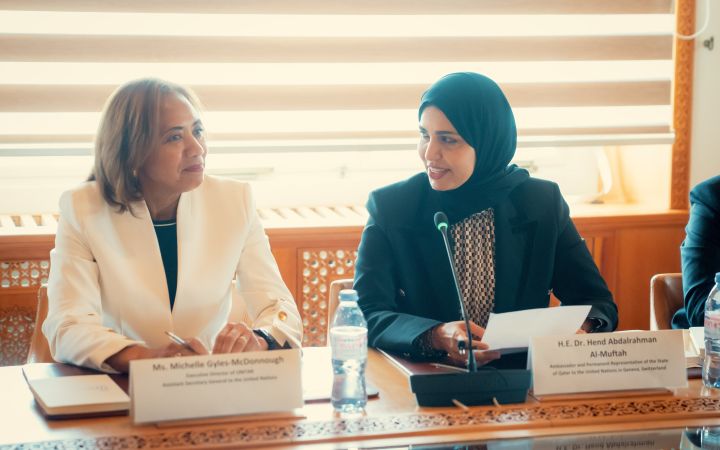Geneva, Switzerland - On 7 May 2025, The United Nations Institute for Training and Research (UNITAR), in collaboration with the Permanent Mission of the State of Qatar to the United Nations in Geneva and the International Law Association (GCC Branch), hosted a High-Level Dialogue on Justice and Capacity-Building in International Law this week at the Palais des Nations in Geneva.
The event brought together diplomats, legal scholars, and practitioners from around the world to examine how Developing Countries, Least Developed Countries (LDCs), and Small Island Developing States (SIDS) can strengthen their legal capacity to engage with and shape international legal processes. Discussions focused on redefining legal empowerment beyond technical training, emphasizing long-term strategic engagement, litigation readiness, and legal diplomacy as essential tools for states to assert their interests and advance justice.
Opening the event, H.E. Dr. Hend Abdalrahman Al-Muftah, Permanent Representative of Qatar to the United Nations in Geneva, highlighted Qatar's commitment to legal capacity-building and regional cooperation. Ms. Michelle Gyles-McDonnough, UNITAR Executive Director and UN Assistant Secretary-General, underlined the Institute's longstanding support for developing countries in accessing and leveraging international legal systems. In her opening remarks, she noted:
We are living in a time of profound turbulence with complex, interlinked global challenges that span political, environmental, economic, technological and social dimensions, with cascading impacts on people. The international architecture is under enormous strain and international norms are being challenged. Therefore, the work of the United Nations and its Member States to secure peace development and human rights, rooted in international law and shared global norms and values, is more critical than ever.
Distinguished experts contributed insights across several key areas. Professor Damilola S. Olawuyi, SAN, UNESCO Chairholder at HBKU College of Law, called for increased local content in legal training programmes to ensure relevance and sustainability.
Mr. Ahmed Essa Al-Sulaiti, Director of the Office of the State of Qatar to the World Trade Organization and Other Economic Organization in Geneva, discussed how Arab legal institutions can better integrate into global legal processes through strategic engagement and cooperation. In his statement, he noted:
Strengthening national legal capacity is essential not only for more effective participation in existing legal frameworks but also for influencing the creation of new rules and preserving sovereignty in today's dynamic legal order.
Dr. Nilüfer Oral, Director of the Centre for International Law at the National University of Singapore and Member of the UN International Law Commission, highlighted the urgent need to strengthen representation from the Global South in international legal proceedings. Dr. Anna Sabrina Wollmann outlined three key priorities for equitable capacity-building: tailored programmes for LDCs and SIDS, enhanced South-South cooperation, and the development of strong legal institutions. Dr. Elodie Tranchez underscored that international law remains one of the most effective levers available to vulnerable states - but only when backed by the strategic capacity to use it.
The event concluded with a networking reception. A joint summary report outlining key recommendations will be published by UNITAR and the Permanent Mission of Qatar to guide future efforts on legal capacity-building and justice promotion in international law.







